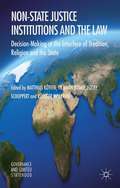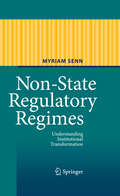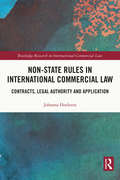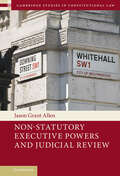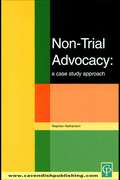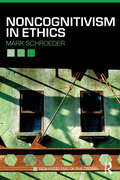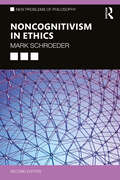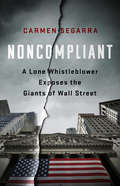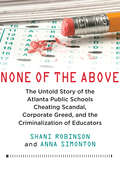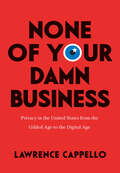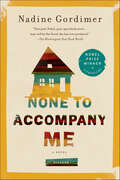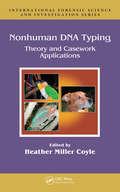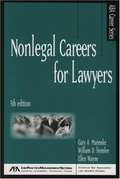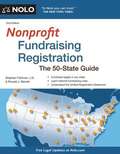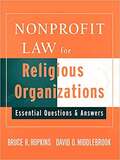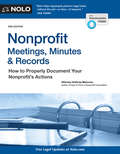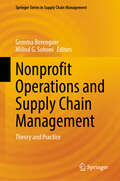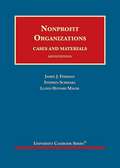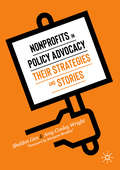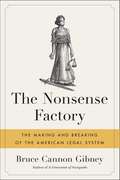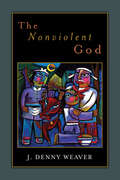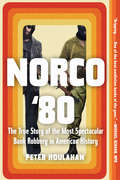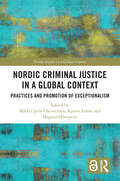- Table View
- List View
Non-State Justice Institutions and the Law
by Matthias K�tter Tilmann J. R�der Gunnar Folke Schuppert R�diger WolfrumThis book focuses on decision-making by non-state justice institutions at the interface of traditional, religious, and state laws. The authors discuss the implications of non-state justice for the rule of law, presenting case studies on traditional councils and courts in Pakistan, South Sudan, Ethiopia, Bolivia and South Africa.
Non-State Regulatory Regimes
by Myriam SennNon-State Regulatory Regimes explores how the concept of regulation continues to evolve. The focus is placed on those forms of regulation that are different from state regulation or present alternatives to state regulation. Departing from an analysis of the goals and policies of the traditional regulatory state, the emergence of 'regulation by other means' is examined. The approach is interdisciplinary encompassing various perspectives be they legal, political, international relations-based, economic, or sociological. The task of comprehending non-state regulation is a daunting one. To date, a number of essays already exist, which concentrate on specific aspects of the issue. In comparison to these essays, this study is innovative in that it applies a holistic view. Linking public policy approaches to regulation, it draws a theoretical path to understanding the emergence and persistence of non-state jurisdictional assertions and regulatory regimes.
Non-State Rules in International Commercial Law: Contracts, Legal Authority and Application (Routledge Research in International Commercial Law)
by Johanna HoekstraThrough further technological development and increased globalization, conducting busines abroad has become easier, especially for Small and Medium Enterprises (SME). However, the legal issues associated with international commerce have not lessened in complexity, including the role of non-state rules. The book provides a comprehensive analysis of non-state rules in international commercial contracts. Non-state rules have legal authority in the national and international sphere, but the key question is how this legal authority can be understood and established. To answer this question this book examines first what non-state rules are and how their legal authority can be measured, it then analyses how non-state rules are applied in different scenarios, including as the applicable law, as a source of law, or to interpret either the law or the contract. Throughout this analysis three other important questions are also answered: when can non-state rules be applied? when are they applied? and how are they applied? The book concludes with a framework and classification that leads to a deeper understanding of the legal authority of non-state rules. Providing a transnational perspective on this important topic, this book will appeal to anyone researching international commercial law. It will also be a valuable resource for arbitrators and anyone working in international commercial litigation.
Non-Statutory Executive Powers and Judicial Review (Cambridge Studies in Constitutional Law #36)
by Jason Grant AllenThat non-statutory executive powers are subject to judicial review is beyond doubt. But current judicial practice challenges prevailing theories of judicial review and raises a host of questions about the nature of official power and action. This is particularly the case for official powers not associated with the Royal Prerogative, which have been argued to comprise a “third source” of governmental authority. Looking at non-statutory powers directly, rather than incidentally, stirs up the intense but ultimately inconclusive debate about the conceptual basis of judicial review in English law. This provocative book argues that modern judges and scholars have neglected the very concepts necessary to understand the supervisory jurisdiction and that the law has become more complex than it needs to be. If we start from the concept of office and official action, rather than grand ideas about parliamentary sovereignty and the courts, the central questions answer themselves.
Non-Trial Advocacy
by Stephen NathansonLawyers use non-trial advocacy skills in court for pre- and post-trial submissions. They are easier to learn than trial advocacy skills, and are much more relevant to the work of most new lawyers. This book examines all key aspects of criminal and civil non-trial advocacy, including bail applications, pleas in mitigation and interim applications made during the course of civil actions. Readers will learn the strategies and techniques of non-trial advocacy through seven realistic case studies: the lawyers involved discuss their strategies and deliver their arguments; the judge makes a decision; and the strengths and weaknesses of the arguments are then analyzed. With this innovative, case study approach to teaching advocacy skills, Non-Trial Advocacy provides an insight into how lawyers think and how they translate their strategies into courtroom action. The book concludes with a discussion of ethical conflicts involved in the practice of advocacy and how these affect the quality of lawyers' work in this field.
Noncognitivism in Ethics (New Problems of Philosophy)
by Mark SchroederAccording to noncognitivists, when we say that stealing is wrong, what we are doing is more like venting our feelings about stealing or encouraging one another not to steal, than like stating facts about morality. These ideas challenge the core not only of much thinking about morality and metaethics, but also of much philosophical thought about language and meaning. Noncognitivism in Ethics is an outstanding introduction to these theories, ranging from their early history through the latest contemporary developments. Beginning with a general introduction to metaethics, Mark Schroeder introduces and assesses three principal kinds of noncognitivist theory: the speech-act theories of Ayer, Stevenson, and Hare, the expressivist theories of Blackburn and Gibbard, and hybrid theories. He pays particular attention both to the philosophical problems about what moral facts could be about or how they could matter which noncognitivism seeks to solve, and to the deep problems that it faces, including the task of explaining both the nature of moral thought and the complexity of moral attitudes, and the ‘Frege-Geach’ problem. Schroeder makes even the most difficult material accessible by offering crucial background along the way. Also included are exercises at the end of each chapter, chapter summaries, and a glossary of technical terms - making Noncognitivism in Ethics essential reading for all students of ethics and metaethics.
Noncognitivism in Ethics (New Problems of Philosophy)
by Mark SchroederAccording to noncognitivists, when we say that stealing is wrong, what we are doing is more like venting our feelings about stealing or encouraging one another not to steal, than like stating facts about morality. These ideas challenge the core not only of much thinking about morality and metaethics, but also of much philosophical thought about language and meaning. Noncognitivism in Ethics is an outstanding introduction to these theories, ranging from their early history through the latest contemporary developments. Beginning with a general introduction to metaethics, Mark Schroeder introduces and assesses three principal kinds of noncognitivist theory: the speech-act theories of Ayer, Stevenson, and Hare; the expressivist theories of Blackburn and Gibbard; and hybrid theories. He pays particular attention both to the philosophical problems about what moral facts could be about or how they could matter, which noncognitivism seeks to solve, and to the deep problems that it faces, including the task of explaining both the nature of moral thought and the complexity of moral attitudes, and the ‘Frege–Geach’ problem. This second edition has been revised and updated throughout. It includes new sections on whether expressivism is a metasemantic thesis; the rise of relational expressivism; the idea that expressivism leads us to a novel understanding of the nature of propositions; and expressivism and epistemic modals, deontic modals, probability, and truth. Schroeder makes even the most difficult material accessible by offering crucial background along the way. Also included are exercises at the end of each chapter, chapter summaries, and a glossary of technical terms, making Noncognitivism in Ethics essential reading for all students of ethics and metaethics.
Noncompliant: A Lone Whistleblower Exposes the Giants of Wall Street
by Carmen SegarraA first-hand account of the oversight of the big banks in the wake of the financial crisis, from the Federal Reserve examiner who refused to be silencedIn 2011, Carmen Segarra took a job as at the Federal Reserve Bank of New York supervising for Goldman Sachs. It was an opportunity, she believed, to monitor the big bank's behavior in order to avoid another financial crisis.Segarra was shocked to discover, however, the full extent of the relationship between Goldman and the Fed. She began making secret recordings that later became the basis of a This American Life episode that exposed the Fed's ineffectiveness in holding banks accountable.In Noncompliant, Segarra chronicles her experience blowing open the doors on the relationship between the big banks and the government bodies set up to regulate them.As we mark the tenth anniversary of the 2008 financial crisis, Noncompliant shows us how little has changed, and offers an urgent call for real reforms.
None of the Above: The Untold Story of the Atlanta Public Schools Cheating Scandal, Corporate Greed , and the Criminalization of Educators
by Shani Robinson Anna SimontonAn insider's account of the infamous Atlanta Public Schools cheating scandal that scapegoated black employees for problems rooted in the education reform movement.In March of 2013, 35 educators in the Atlanta Public Schools were charged with racketeering and conspiracy--the same charges used to bring down the American mafia--for allegedly changing students' answers on standardized tests. All but one was black. The youngest of the accused, Shani Robinson, had taught for only 3 years and was a new mother when she was wrongfully convicted and faced up to 25 years in prison. She and her coauthor, journalist Anna Simonton, look back to show how black children in Atlanta were being deprived long before some teachers allegedly changed the answers on their students' tests.Stretching all the way back to Brown v. Board of Education, the landmark 1954 Supreme Court ruling that outlawed segregation in public schools, to examining the corporate-led education reform movement, the policing of black and brown citizens, and widening racial and economic disparities in Atlanta, Robinson and Simonton reveal how real estate moguls and financiers were lining their pockets with the education dollars that should have been going to the classroom.
None of Your Damn Business: Privacy in the United States from the Gilded Age to the Digital Age
by Lawrence CappelloA “thorough and lively” investigation into the history of privacy in America, why so many of us have surrendered it, and the implications for our future (American Historical Review).Every day, Americans surrender their private information to entities claiming to have their best interests in mind. This trade-off has long been taken for granted, but the extent of its nefariousness has recently become much clearer. As None of Your Damn Business reveals, the problem is not so much that data will be used in ways we don’t want, but rather how willing we have been to have our information used, abused, and sold right back to us. In this startling book, Lawrence Cappello targets moments from the past 130 years of US history when privacy was central to battles over journalistic freedom, national security, surveillance, big data, and reproductive rights. As he makes dismayingly clear, Americans have had numerous opportunities to protect the public good while simultaneously safeguarding our information, and we’ve squandered them every time. None of Your Damn Business is a rich and provocative survey of an alarming topic that grows only more relevant with each fresh outrage of trust betrayed.“Engaging . . . a must-read for legislators, policymakers, and anyone curious about the ways their privacy could potentially be compromised by the government, the media, or data brokers.” —Publishers Weekly
None to Accompany Me: A Novel
by Nadine GordimerNone to Accompany Me is arresting and reverbant - perhaps the most powerful novel to date by one of the world's most commanding writers.In an extraordinary period immediately before the first non-racial election and the beginning of majority rule in South Africa, Vera Stark, the protagonist of Nadine Gordimer's passionate novel, weaves a ruthless interpretation of her own past into her participation into the present as a lawyer representing blacks in the struggle to reclaim the land.
Nongovernmental Organizations in Enviromental Struggles: Politics and the Making of Moral Capital in the Philippines
by Raymond L. BryantWhy are nongovernmental organizations (NGOs) so successful in today's world? How do they empower themselves? This insightful book provides important new perspectives on the strategic thinking of NGOs, the way they identify themselves, and how they behave. Raymond L. Bryant develops a novel theoretical perspective around the concept of moral capital and assesses that concept through in-depth case studies of NGOs in the Philippines. The book's focus is on perceptions of NGOs as moral and altruistic and how such perceptions can translate into social power. Bryant examines the ambiguous qualities of NGO strategizing, the ways in which the quest for moral capital is bedeviled by the need to compromise with political and economic elites, and the possibilities for NGOs to achieve political goals as moral leaders.
Nonhuman DNA Typing: Theory and Casework Applications (International Forensic Science and Investigation)
by Heather Miller CoyleThe association of a suspect with the victim or crime scene through DNA evidence is one of the most powerful statements of complicity in a crime imaginable. No category of evidence has ever had the complete capacity to convict or exonerate an accused so absolutely in the eyes of the public. With the discriminatory powers of DNA and the variety of D
Nonlegal Careers for Lawyers
by Gary A. Munneke William D. Henslee Ellen WayneGreat opportunities exist for law students and practicing lawyers outside the traditional practice of law. This important resource shows you when and how to choose a nonlegal career; the specialized skills legal training provides; how to plan and conduct a job search; and provides details on careers in business and industry, government and public service, associations and institutions, and entrepreneurial ventures. A resource section provides surveys and listings of nonlegal careers in several categories, and a listing of publishers and suggested readings on nonlegal careers.
Nonpartisan Primary Election Reform
by R. Michael Alvarez J. Andrew SinclairOver the years, observers of American politics have noted the deleterious effects of party polarization in both the national and state legislatures. Reformers have tried to address this problem by changing primary election laws. A theory underlies these legal changes: the reformers tend to believe that "more open" primary laws will produce more centrist, moderate, or pragmatic candidates. The "top-two" primary, just implemented in California, represents the future of these antiparty efforts. Mitigating Mischief examines California's first use of the top-two primary system in 2012. R. Michael Alvarez and Andrew Sinclair evaluate the primary from a variety of perspectives and using several different methodologies. Although the first use of this primary system in California did not immediately reshape the state's politics, it also did not have many of the deleterious consequences that some observers had feared. This study provides the foundation for future studies of state primary systems.
Nonprofit Fundraising Registration
by Stephen FishmanRaise money for your nonprofit without IRS trouble! Your nonprofit needs financial support, which means that you're most likely dependent on the kindness of donors to fill your coffers. If your nonprofit plans to solicit funds from out-of-state donors by phone, letter, email, on the web, or in any other manner, it's essential to fill out IRS Form 990 so that your organization stays legal. Nonprofit Fundraising Registration is your 50-state guide to the complex and varied registration requirements you'll need to meet while fundraising for your nonprofit. Learn how to keep your 501(c)(3) status when you're collecting cash, including: . exemptions from registration . how to register in different states . initial and annual filing requirements . rules for professional fundraisers . other crucial information your organization needs to legally fundraise outside of your home state You can't afford to overlook registration requirements -- use Nonprofit Fundraising Registration, your plain-English guide, to keep your nonprofit status in the eyes of the IRS. Plus, get the background information you need and get a line-by-line tutorial for the Unified Registration Statement, contact information for each state, and instructions on filing requirements for each state.
Nonprofit Law For Religious Organizations: Essential Questions And Answers
by Bruce R. Hopkins David MiddlebrookNonprofit Law for Religious Organizations: Essential Questions & Answers is a hands-on guide to the most pertinent and critical legal issues facing those who lead and manage religious tax-exempt organizations with an emphasis on tax, employment, property and constitutional law. This timely book is a response to the need for guidance, direction, and clarification of legal and tax laws affecting churches and other religious organizations.
Nonprofit Meetings, Minutes & Records: How To Run Your Nonprofit Corporation So You Don't Run Into Trouble
by Anthony MancusoNonprofit? Stay out of IRS trouble with the ultimate corporate housekeeping tool! Nearly 1.5 million nonprofit organizations are busy preserving historic sites, saving libraries, helping the homeless, greening our cities--and so much more. Yet, while some have sophisticated record-keeping systems, most nonprofits are staffed by volunteers who need help running the organization and keeping up a proper--and legal--paper trail. Help has arrived! With Nonprofit Meetings, Minutes & Records, you'll get the all-in-one solution every nonprofiteer needs to hold meetings and document actions taken by board members. Step by step, it walks readers through: calling meetings appointing officers taking minutes making resolutions voting on proposals adjourning meetings working with a lawyer, if necessary, and finding a tax adviser. Nonprofit Meetings, Minutes & Records also provides useful tips and advice on how to do important tasks, such as organizing records, preparing meeting folders, and taking minutes. Plus, all necessary legal documents are included for you to fill out. It's everything you need to keep your nonprofit running smoothly and legally.
Nonprofit Operations and Supply Chain Management: Theory and Practice (Springer Series in Supply Chain Management #25)
by Gemma Berenguer Milind G. SohoniThis book explores nonprofit organizations (NPOs) from an operations and supply chain management (OM/SCM) perspective. Traditionally, OM/SCM research has concentrated on for-profit businesses in sectors like retail and manufacturing. In contrast, nonprofit sectors such as food banks, nursing homes, educational institutions, social services, and humanitarian relief have been less studied but are the focus of this book. The study of NPO activities forms the nascent and novel field of Nonprofit Operations and Supply Chain Management. This distinctive book compiles research on the emerging field of NPO operations and supply chain management. From an operational perspective, it analyses how NPOs operate based on not-for-profit incentives, where some specific operational decisions such as fundraising, resource allocation, workforce scheduling, or transportation are studied in detail. From a supply chain perspective, the book highlights the diverse actors involved, including suppliers, donors, NPOs, and beneficiaries. It emphasizes the complexity of the donation channel in nonprofit supply chains, detailing various participants who either facilitate donation flow or ensure aid reaches beneficiaries. The book covers a range of topics from theoretical frameworks to practical applications, such as not-for-profit goals, ownership transitions, cash and in-kind donation management, and volunteer coordination in both offline and online environments. This co-edited volume presents a collection of recent innovative research on nonprofit OM/SCM from top global scholars and practitioners. It is mainly aimed at graduate students and researchers in supply chain management, operations management, and operations research. Additionally, academics from other fields studying nonprofit organizations and professionals in the nonprofit sector will find it valuable.
Nonprofit Organizations, Cases and Materials (University Casebook Series)
by James Fishman Stephen Schwarz Lloyd MayerThe Sixth Edition of this widely used casebook includes the usual rich mix of materials and is adaptable to a survey course, a policy-oriented seminar, or a more specialized J.D. or LL.M tax class. Every major topic is accompanied by a skillfully developed problem set and lively notes, questions, policy discussion, and bibliographic references. Highlights of the Sixth Edition include: Coverage of all important developments since the last edition, including the impact of the COVID-19 pandemic on the nonprofit sector; recent legislation and final regulations on the new excise taxes on excessive executive compensation and large charitable endowments, and the unrelated business tax “silo” rules; major antitrust litigation against the NCAA and related legislative proposals to expand the rights of college athletes; and state law developments.Selective discussion of the American Law Institute’s forthcoming Restatement of the Law of Charitable Nonprofit Organizations.Division of the chapter on charitable tax exemptions into two chapters, separately covering affirmative requirements for tax exemption (Chapter 5) and limitations on exemptions and procedural requirements (Chapter 6).Updated author’s text addressing the robust policy debate over income inequality, “elite philanthropy,” and the implications for reform of the charitable deduction. Surveys of proposed tax legislation, including enhanced regulation of donor-advised funds and private foundations. Pruning of dated materials, more tightly edited cases and notes, and several new problems.
Nonprofits in Policy Advocacy: Their Strategies and Stories
by Sheldon Gen Amy Conley WrightPolicy advocacy is an increasingly important function of many nonprofit organizations, as they seek broad social changes in their concerning issues. Their advocacy practices, however, have often been guided by their own past experiences, anecdotes from peer networks, and consultant advice. Most of their practices have largely escaped empirical and theoretical grounding that could better root their work in established theories of policy change. The first book of its kind, Nonprofits in Policy Advocacy bridges this gap by connecting real practices of on-the-ground policy advocates with the burgeoning academic literature in policy studies. In the process, it empirically identifies six distinct policy advocacy strategies, and their accompanying tactics, used by nonprofits. Case studies tell the stories of how advocates apply these strategies in a wide variety of issues including civil rights, criminal justice, education, energy, environment, public health, public infrastructure, and youth. This book will appeal to both practitioners and academicians, as each gains insights into the other’s views of policy change and the actions that produce it.
The Nonsense Factory: The Making and Breaking of the American Legal System
by Bruce Cannon GibneyA withering and witty examination of how the American legal system, burdened by complexity and untrammeled growth, fails Americans and threatens the rule of law itself, by the acclaimed author of A Generation of Sociopaths.Our trial courts conduct hardly any trials, our correctional systems do not correct, and the rise of mandated arbitration has ushered in a shadowy system of privatized "justice." Meanwhile, our legislators can't even follow their own rules for making rules, while the rule of law mutates into a perpetual state of emergency. The legal system is becoming an incomprehensible farce. How did this happen?In The Nonsense Factory, Bruce Cannon Gibney shows that over the past seventy years, the legal system has dangerously confused quantity with quality and might with legitimacy. As the law bloats into chaos, it staggers on only by excusing itself from the very commands it insists that we obey, leaving Americans at the mercy of arbitrary power. By examining the system as a whole, Gibney shows that the tragedies often portrayed as isolated mistakes or the work of bad actors -- police misconduct, prosecutorial overreach, and the outrages of imperial presidencies -- are really the inevitable consequences of law's descent into lawlessness.The first book to deliver a lucid, comprehensive overview of the entire legal system, from the grandeur of Constitutional theory to the squalid workings of Congress, The Nonsense Factory provides a deeply researched and witty examination of America's state of legal absurdity, concluding with sensible options for reform.
The Nonviolent God
by J. Denny WeaverThis bold new statement on the nonviolence of God challenges long-standing assumptions of divine violence in theology, the violent God pictured in the Old Testament, and the supposed violence of God in Revelation. In The Nonviolent God J. Denny Weaver argues that since God is revealed in Jesus, the nonviolence of Jesus most truly reflects the character of God.According to Weaver, the way Christians live -- Christian ethics -- is an ongoing expression of theology. Consequently, he suggests positive images of the reign of God made visible in the narrative of Jesus -- nonviolent practice, forgiveness and restorative justice, issues of racism and sexism, and more -- in order that Christians might live more peacefully.
Norco '80: The True Story of the Most Spectacular Bank Robbery in American History
by Peter Houlahan5 young men. 32 destroyed police vehicles. 1 spectacular bank robbery. This “cinematic” true crime story transports readers to the scene of one of the most shocking bank heists in U.S. history—a crime that’s almost too wild to be real (The New York Times Book Review).Norco ’80 tells the story of how five heavily armed young men—led by an apocalyptic born–again Christian—attempted a bank robbery that turned into one of the most violent criminal events in U.S. history, forever changing the face of American law enforcement. Part action thriller and part courtroom drama, this Edgar Award finalist for Best Fact Crime transports the reader back to the Southern California of the 1970s, an era of predatory evangelical gurus, doomsday predictions, megachurches, and soaring crime rates, with the threat of nuclear obliteration looming over it all.In this riveting true story, a group of landscapers transforms into a murderous gang of bank robbers armed to the teeth with military–grade weapons. Their desperate getaway turns the surrounding towns into war zones. And when it’s over, three are dead and close to twenty wounded; a police helicopter has been forced down from the sky, and thirty–two police vehicles have been completely demolished by thousands of rounds of ammo. The resulting trial shakes the community to the core, raising many issues that continue to plague society today: from the epidemic of post–traumatic stress disorder within law enforcement to religious extremism and the militarization of local police forces.
Nordic Criminal Justice in a Global Context: Practices and Promotion of Exceptionalism (Nordic Studies in a Global Context)
by Mikkel Jarle Christensen, Kjersti Lohne and Magnus HörnqvistThis book critically investigates Nordic criminal justice as a global role model. Not taking this role for granted, the chapters of the book analyse how Nordic approaches to criminal justice were folded into global contexts, and how patterns of promotion were built around perceptions that these approaches also had a particular value for other criminal justice systems. Specific actors, both internal and external to the region itself, have branded Nordic criminal justice as a form of ‘penal exceptionalism’ associated with human rights, universalistic welfare and social cohesion. The book shows how building and using the brand of Nordic criminal justice allowed stakeholders to champion specific forms of crime control across a variety of criminal justice areas in both domestic and international settings. The book will be of interest to scholars and students of criminal justice, international law and justice, Nordic and Scandinavian studies, and more widely to the social sciences and humanities.
